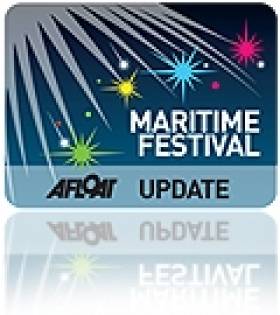Displaying items by tag: Dan Minchin
Boat Builder to Feature at Dromineer Literary Festival
Shannon Boat Builder Jimmy Furey will be a special guest at the Dromineer Literary Festival at the end of the month. The appearance conicides with a screening of David Shaw-Smith's landmark documentary series
'Hands' featuring the Shannon-one-Design Boatbuilder.
The eighth annual Dromineer Literary Festival will take place from Thursday September 29 to Sunday October 2 at Lough Derg Yacht Club in Dromineer village.
At 8pm, Thursday night September 29, Dermot Healy, Kerry Hardie and Catherine Phil McCarthy will give a poetry reading at 8pm, Lough Derg Yacht Club, and on Saturday night, October 1, The Poetry Divas will perform at The Whiskey Still pub in the village.
The Meet the Authors event attracts huge audiences each year, and we are delighted that Jennifer Johnston and John MacKenna will be reading and in discussion on Saturday night, October 1, at 8pm at Lough Derg Yacht Club. We encourage our audience to read these authors to increase their enjoyment of the event.
A performance presented by the renowned Nenagh Players to close the weekend is of CS Lewis' A Grief Observed. This one man show, adapted and performed by Ronan Dodd, will take place from 8pm, Sunday night, October 2. A Grief Observed was written by Lewis after the death of his wife, Joy Gresham, from cancer in 1960.
The Sunday afternoon event afloat aboard the passenger vessel The Spirit of Killaloe, is entitled The Living Lake. Scientists Rick Boelens and Dan Minchin will give a talk on the hidden depths of Lough Derg; its biodiversity and environmental heritage. Places are strictly limited, to ensure a place, please contact Eleanor at emhooker@ eircom.net
This year, for the first time, the festival will feature film. A Short Movie written and directed by George Hooker, and produced by Sorcha MacKenna, students at DIT, will be premiered at 3pm on Saturday afternoon October 1 at Lough Derg Yacht Club. Filmed on location in Dromineer in June 2010, the short movie stars Nenagh Players actors, the late Stephen Toohey (with the kind blessings of his family), Niamh Hogan and Olly Griffin. All welcome. Admission is free.
Also on Saturday October 1, David Shaw-Smith will give a talk on his landmark documentary series 'Hands' Boatbuilder with Shannon-one-Design Boatbuilder Jimmy Furey attending as our special guest. Other films in the Hands series will be screened at Neddy's Cottage in the village, thoughout the weekend.
Committee is pleased to announce the 2011 festival programme. Highlights include authors Jennifer Johnston, Dermot Healy, John MacKenna, and Vincent McDonnell, Poets Kerrie Hardie, Catherine Phil McCarthy and The Poetry Divas, a Short Movie by young filmmakers from Dublin Institute of Technology and more.
POETRY READINGS
Thursday 29 September, 8pm Lough Derg Yacht Club (Adm - €5)
– Dromineer Festival Poetry with Dermot Healy, Kerrie Hardie and Catherine Phil McCarthy
Saturday 1 October, The Whiskey Still, Dromineer Village
– 10.30pm The Poetry Divas will perform their poetry in The Whiskey Still pub
OFFICIAL OPENING
Friday 30 September, 7.30pm, Lough Derg Yacht Club
– Offical Opening with Dr. Ed Walsh.
– Competition Results & Readings
MEET THE AUTHORS
Saturday 1 October, 8-10pm, Lough Derg Yacht Club
– Meet the Authors with Jennifer Johnston and John MacKenna (Adm €12/€10)
–
FILM -SCREENINGS
Saturday 1 October, Lough Derg Yacht Club
– 3-4pm Short Film Premiere by Media Arts Students, DIT, Dublin. Written & Directed by George Hooker. Directed by Sorcha MacKenna (Free Adm)
– 4-5.30pm Hands Boatbuilder. Talk by David Shaw-Smith, followed by screening of his landmark documentary. Special guest Jimmy Furey. (Adm - €5)
AFLOAT ON LOUGH DERG
Sunday 2 October, Sunday Afternoon Afloat
– The Living Lake, a talk by scientists Rick Boelens & Dan Minchin aboard The Spirit of Killaloe (Adm €12/€10)
DRAMA - Festival Finale
Sunday 2 October, 8pm, Lough Derg Yacht Club,
– The Nenagh Players present Ronan Dodd 'A Grief Observed'
























































